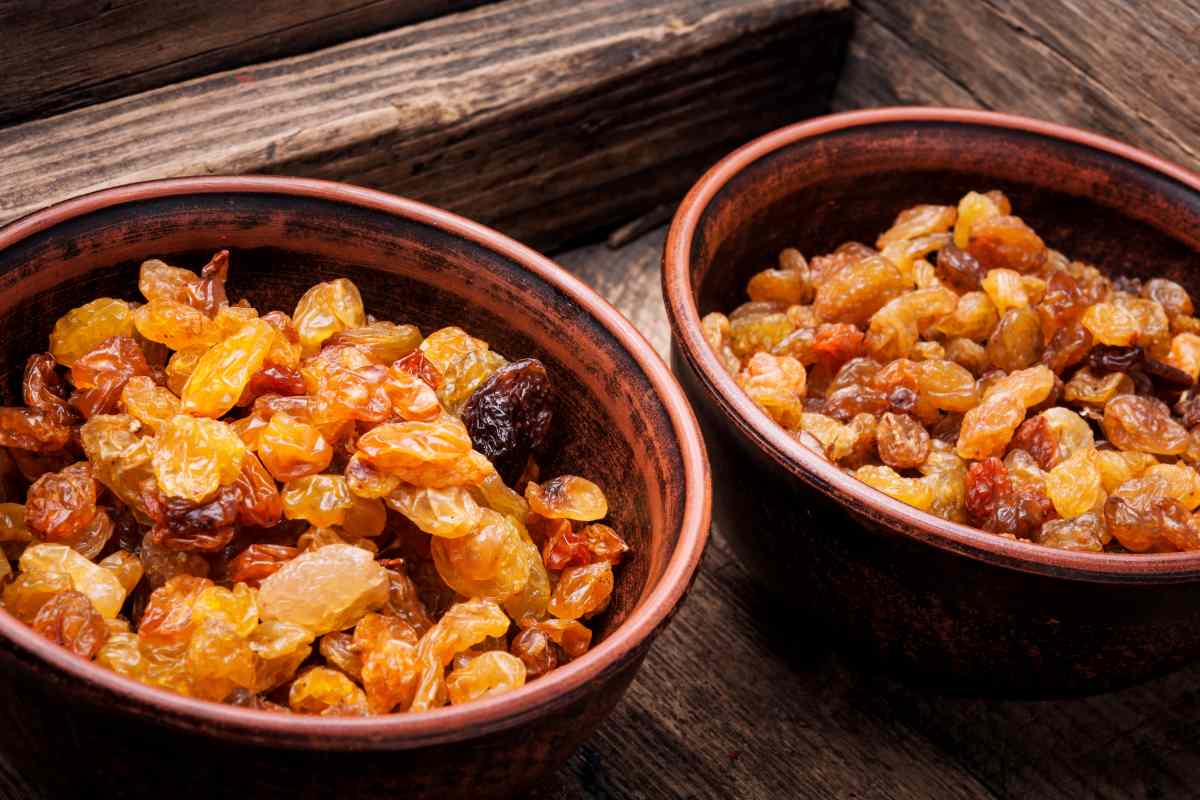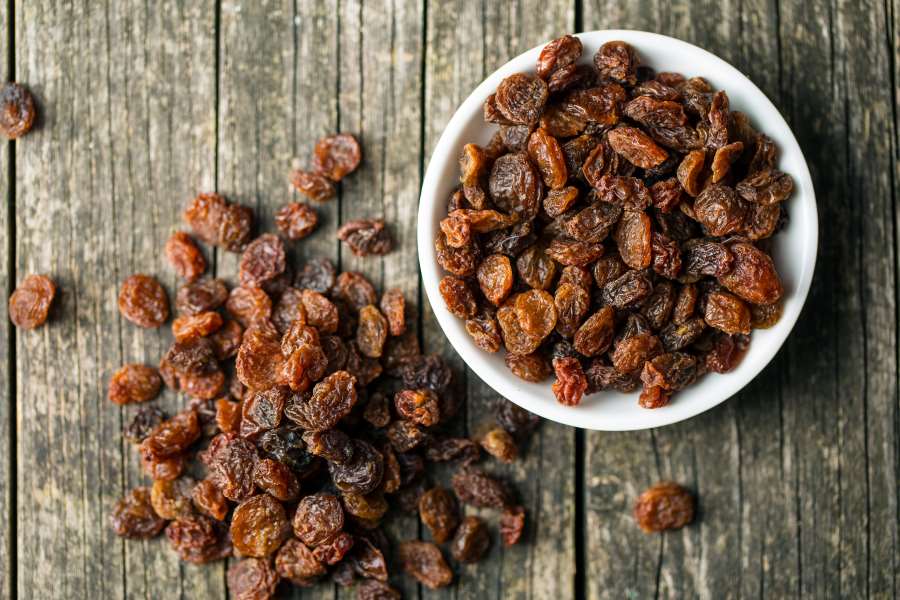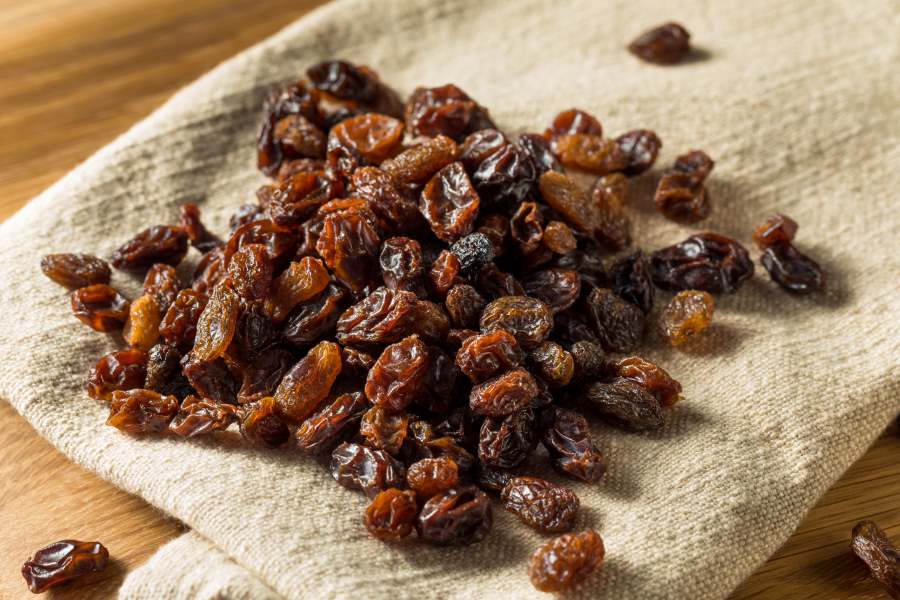15 Essentials Health Benefits of Raisins

Raisins are generally dried grapes. This drying process makes raisins high in nutrients and calories as both the sugar and nutrients present in grapes get concentrated. Raisins primarily originated in Middle East countries and migrated westward to Europe, where they gained high popularity among the Romans and Greeks.
There are several health benefits of raisins as they account for an excellent source of fibre and antioxidants. However, they also contain high levels of sugar. So, moderation is key when consuming these dried grapes.

Table of Contents

Top 15 Health Benefits of Raisins

Raisins vary in colour and flavour depending on which drying method was used. Golden-yellow raisins are dried with the assistance of sulphur dioxide, red varieties rely on the sun's heat, and brown raisins use a combination of both methods. These methods increase the nutritional value significantly. But there are various benefits of eating raisins daily, and they are as follows –
1. Helps in Digestion
Raisins are a healthy snack as they contain high amounts of fibre, which contributes to a laxative effect on the stomach. This helps relieve constipation and keeps bowel movements smooth. Raisins also eliminate waste products and toxins from the body. They are effective in relieving bloating, acid reflux and flatulence.
2. Promotes Healthy Hair and Skincare
A recent study found that raisins contain resveratrol, a compound shown to protect blood cells from toxic damage, purify the blood, and prevent saggy skin and wrinkles. Raisins also help to prevent hair loss problems and maintain shiny hair, especially conditions like dandruff, flakiness and scalp itchiness.
3. Helps to Improve Eyesight
Raisins are a good source of polyphenolic phytonutrients such as beta carotene, vitamin A and A-carotenoid. These nutrients act as antioxidants, protecting your eyesight by restricting free radical action that can lead to muscular degeneration and even cause cataracts.
4. Improves Heart Health and Regulates Cholesterol Levels
Regular raisin consumption helps control bad cholesterol and increase good cholesterol. This, in turn, helps to improve cardiovascular health by preventing blood clots and other cardiovascular problems.
5. Regulates Blood Pressure
Raisins are low in sodium, which can help lower blood pressure. Raisins also contain potassium, which can help balance the sodium in your body and relax your blood vessels.
6. Prevents Anaemia
Raisins are a rich source of iron, copper, and vitamins B1, B2, and PP. These elements are essential to the formation of red blood cells and carrying oxygen throughout the body. This, in turn, helps to prevent anaemia.
7. Cures Infertility Problems
Raisins are rich in natural sugars, which release energy and help treat erectile dysfunction. They also contain arginine, which helps improve sperm motility and is useful for treating infertility.
8. Improves Bone Strength
According to research, raisins are a good source of calcium and boron. Calcium is required for bone strength. Boron helps in bone formation. Therefore, especially eating soaked raisins helps you absorb nutrients better and improves your bone density.
9. Restricts Tooth Decay
Raisins contain oleanolic acid, which helps to restrict tooth decay. It breaks down the sticky substances that hold bacteria to teeth, keeping them clean and healthy, thus preventing cavities. They also help whiten teeth by contributing to the maintenance of tooth enamel.
10. Reduces Acidity and Bloating
Raisins are rich in magnesium and potassium, which help to detoxify the acidity in the body. Further, consuming raisins on a regular basis can reduce the levels of toxicity in the blood and also conditions such as flatulence and bloating.
11. Aids in Weight Loss
Raisins are a naturally sweet fruit that is low in calories, rich in fibre and help you curb your sweet cravings. They also help the body feel full for long with just a small serving and help control blood sugar levels, which helps people lose weight.
12. Boosts Immunity
Raisins are a good source of iron and vitamin C. The iron and vitamin C in raisins help build your immune system and fight off infections. They also have anti-inflammatory properties, which help strengthen your immunity, so your body is less susceptible to infections.
13. Rich in Nutrients
Raisins contain essential vitamins and minerals, including iron, potassium, calcium, and B vitamins. These nutrients support overall health, contribute to energy production, and help maintain healthy bones and muscles. Regular consumption can help meet your daily nutritional needs.
14. Antioxidant Properties
Raisins contain powerful antioxidants like polyphenols and flavonoids, which protect the body from oxidative stress and damage caused by free radicals. These antioxidants can reduce inflammation, improve immune function, and lower the risk of chronic diseases such as heart disease and cancer.
15. Boosts Iron Levels
Raisins are a good source of iron, an essential mineral for producing red blood cells and preventing anaemia. Regular consumption of raisins can help improve iron levels, especially for individuals with an increased need, such as women during menstruation or people with iron-deficiency anaemia.
What are the Nutritional Value of Raisins?
The table below displays the amounts of nutrients present in 100 grams of raisins.
Calculate Your Health Metrics Instantly
How to Include Raisins in Your Daily Diet?

Raisins offer many health benefits. You can eat them right from the box, or you can incorporate them into meals. Savoury dinners, breakfasts, and desserts there are numerous possibilities. You now know how to enjoy raisins while maintaining a healthy diet. So let us now take a look at some lip-smacking raisin recipes that you can try out for yourself.
- Granola is a great way to start your day, but many people think it's too difficult to make at home. However, with a bit of practice and some patience, making homemade granola is a breeze. The cinnamon raisin granola can easily be made gluten-free or vegan.
- Flourless oatmeal raisin cookies are a healthy alternative to the classic. In this recipe, rolled oats and whole wheat flour are replaced by ground nuts and raisins. This makes a healthier oatmeal raisin cookie than the traditional style.
- Spice up your salad with some sweet apples and raisins.
- Adding raisins to your pasta may seem strange, but this dish is high in iron and fibre content and is very delicious.
- Raisin butter is delicious to spread on toast, bagels, or muffins. It’s also a great addition to baked goods such as cookies, cakes or brownies. If you don’t like cashews, you can substitute another nut.
- Flaxseed Muffins, pumpkins, and raisins are filled with healthy fibre.
What are the Side Effects of Overeating Raisins?
Everything in excess can be a problem. Raisins are a healthy snack, but people trying to lose weight should be careful about how many they eat. The following pointers determine the side effects that can occur due to over-consumption of raisins -
- Causes Unhealthy Body Cells: Raisins contain phytonutrients, bioflavonoids and polyphenols, all of which are antioxidants. However, while raisins are healthy when consumed in moderation, too many can be harmful. When there is too much antioxidant in our system, free radicals first react with them before turning on the body's healthy cells.
- Causes Diarrhoea: Raisins are an excellent source of dietary fibre. Eating too many can cause flatulence and stomach upset, as well as other problems such as cramps and may even lead to diarrhoea.
- Triggers Diabetes: Diabetic patients should be careful not to overindulge in raisins, as they are high in calories and sugar.
- Causes Dehydration and Indigestion: Raisins are rich in fibre. Dietary fibre can aid digestion and relieve constipation. However, too much dietary fibre may decrease the absorption of other nutrients and cause dehydration and indigestion and ultimately lead to several severe digestive disorders.
- Increases Calories: Raisins contain a large number of calories. If you are on a weight loss diet, you should consume raisins in moderation.
- Weight Gain: Raisins are calorie-dense due to their high sugar content. Consuming large quantities can lead to an excessive caloric intake, resulting in weight gain. Balancing raisin consumption with other lower-calorie foods is essential to maintain a healthy weight.
- Digestive Issues: High in fibre, excessive raisin consumption can lead to digestive problems such as bloating, gas, and diarrhoea. While fibre benefits digestion, too much can overwhelm the digestive system and cause discomfort.
- Allergic Reactions: Some raisins are treated with sulfites to preserve freshness, which can cause allergic reactions in sensitive individuals. Symptoms may include headaches, hives, and respiratory issues. Opting for organic, sulfite-free raisins can reduce this risk.
- Kidney Stones: Raisins contain oxalates, which can contribute to kidney stone formation when consumed in large amounts. Individuals prone to kidney stones should limit their intake of high-oxalate foods, including raisins, to minimise the risk.
- Dehydration: Although raisins are dried fruits, eating them in excess without adequate water intake can lead to dehydration. The high fibre content requires additional fluids to aid in digestion and prevent constipation.
Who Should Avoid Eating Raisins?
Raisins are rich in fibre and they can help you improve your digestive health. Although eating too much dietary fibre is bad for your digestive health and it might decrease the absorption of other nutrients. Dietary fibres can absorb excess fluid from our system and aid in treating diarrhoea.
- People with Allergies: Those who are allergic to grapes or sulfites (used as preservatives in some raisins) should avoid them.People with sulfite sensitivity may experience symptoms like, respiratory problems, skin rashes, and stomach issues.
- Diabetics: Raisins have a high glycemic index, which can cause blood sugar spikes. Diabetics should consume them in moderation and monitor their blood sugar levels.Diabetics should eat raisins in small portions and pair them.
- Individuals with Dental Issues: Raisins are sticky and can cling to teeth, potentially contributing to cavities and other dental problems.with dental issues should ensure they brush and floss regularly, especially after eating sticky foods like raisins.
- People with Digestive Issues: High fibre content in raisins can cause digestive discomfort, such as gas or bloating, in some individuals.Introducing raisins into the diet gradually and drinking plenty of water can help mitigate digestive discomfort.
- Individuals on a Low-Sugar Diet: Raisins are high in natural sugars, which might not be suitable for those on low-sugar or low-carb diets.People on low-sugar or low-carb diets should be mindful of their raisin intake.
- Young Children: Raisins can be a choking hazard for very young children. Due to their small size and sticky texture, raisins can pose a choking risk for young children, especially those under the age of four.
Raisins, with their wrinkled skin and shrivelled appearance, may not seem appealing to most people. Despite this unappealing exterior, the health benefits of raisins are manifold as they come loaded with important nutrients. They are rich in fibre and vitamins, minerals, energy and electrolytes.
Raisins also contain a good amount of iron which helps prevent anaemia by increasing the level of haemoglobin in the blood. In addition to boosting your health, these dried grapes can be used as a healthy alternative to sugary candies.
Protect What Matters - Explore Other Insurance Options














